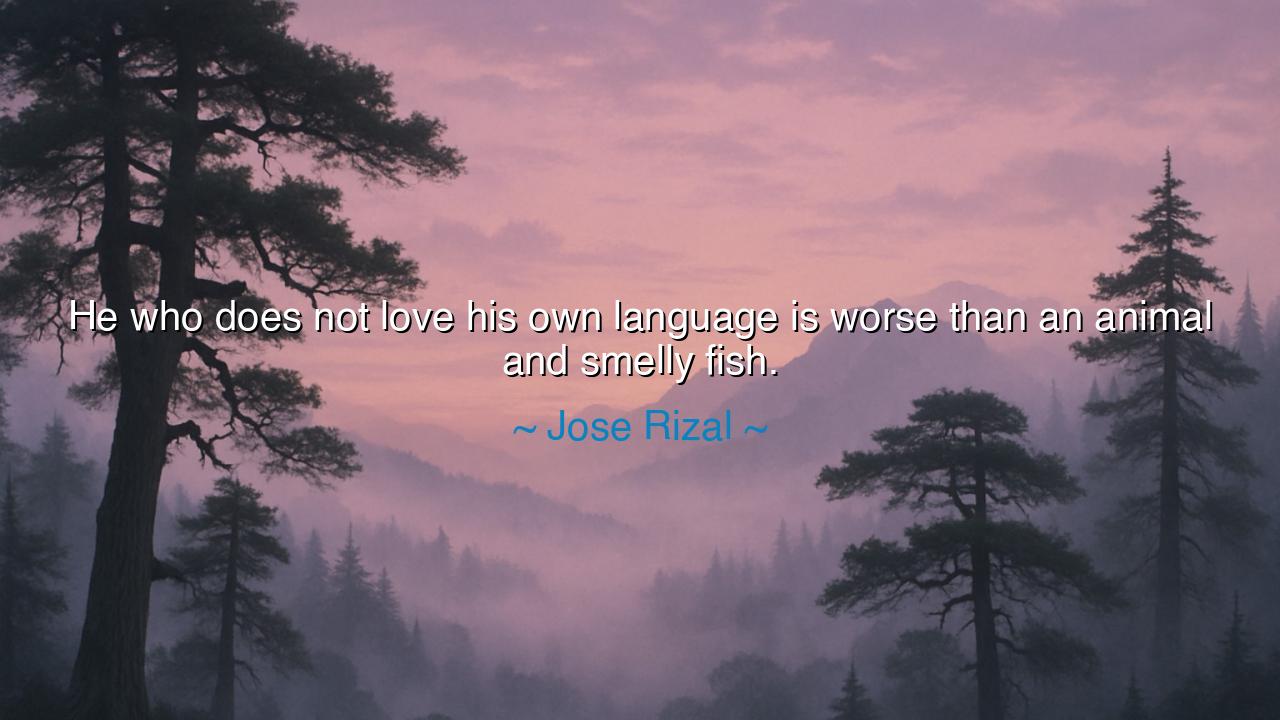
He who does not love his own language is worse than an animal and






“He who does not love his own language is worse than an animal and smelly fish.” Thus spoke José Rizal, the great soul of the Philippines, whose words burn like torches in the long night of colonial oppression. Though sharp and severe, his saying was born not of contempt, but of love — love for his people, for his homeland, for the spirit that dwells within every tongue. For Rizal understood that language is not mere sound; it is the living vessel of a nation’s memory, its dignity, and its soul. To lose it is to lose oneself; to despise it is to deny one’s own humanity.
In the time of Rizal, his country lay under foreign rule, its people taught to forget their native speech, to bow to the tongue of their conquerors. The colonizers told them that progress meant imitation, that greatness meant abandoning their roots. But Rizal, whose heart was both scholar and patriot, saw the danger of this deceit. He knew that a people without love for their own language would soon forget their stories, their ancestors, their purpose. He compared such loss not to mere ignorance, but to decay — the “smelly fish”, dead to its own life, rotting in the absence of its natural waters.
To love one’s language is not simply to speak it, but to honor what it carries. Every word of a native tongue holds within it the laughter of children, the prayers of elders, the poetry of the land itself. It holds the shape of rivers and the rhythm of rain, the wisdom of those who came before. When Rizal warned that the one who rejects his language is worse than a beast, he meant that such a person has cut himself off from the chain of humanity — for beasts live without history, without memory, without belonging. But humans, he said, live by roots, and language is the deepest of them all.
Consider the story of Ngũgĩ wa Thiong’o, the Kenyan writer who, like Rizal, saw his people’s tongue oppressed by foreign rule. He once wrote that “language is the carrier of culture.” When his people abandoned their own words for the colonizer’s speech, they began to lose the stories that made them who they were. So Ngũgĩ chose to write in his native Gikuyu, even when it meant imprisonment. He knew that to reclaim one’s language is to reclaim one’s freedom — and to preserve the voice of the ancestors for generations yet unborn. Rizal would have understood him perfectly.
Indeed, every nation that has risen from bondage has done so by returning to its own words. For language is identity, and identity is power. A man who cannot speak his native tongue has been silenced in the most profound way. He may wear the clothes of modernity, he may walk among the learned, but his spirit wanders homeless. The colonizers feared native languages because they knew their strength — that in a single phrase spoken in one’s mother tongue lies the defiance of centuries, the unbroken will of a people who remember who they are.
Yet Rizal’s teaching reaches beyond borders and history. It calls not only to Filipinos, but to all humankind. In a world that grows ever more uniform, where tongues are traded for convenience and dialects fade into dust, his voice reminds us that diversity of language is the diversity of life itself. To love one’s own language is not to reject others, but to honor the sacred thread that ties one’s spirit to the past. The one who keeps his mother tongue alive keeps his culture alive; the one who forgets it drifts rootless, like a leaf torn from the tree.
So, my child, guard your language as you would guard your soul. Speak it not with shame, but with pride. Teach it to your children, sing it in your songs, write it in your stories. For every syllable you speak in your native tongue is an act of remembrance — a declaration that you still belong to the people who shaped you.
And remember the lesson of Rizal: to love your language is to love yourself, your heritage, your freedom. The beasts may live without words, and the fish may rot when torn from its sea — but you, child of your land, were born with a voice. Use it. Keep it. Cherish it. For in doing so, you keep the heart of your people beating, and you prove to the ages that the spirit of your nation shall never die.






AAdministratorAdministrator
Welcome, honored guests. Please leave a comment, we will respond soon